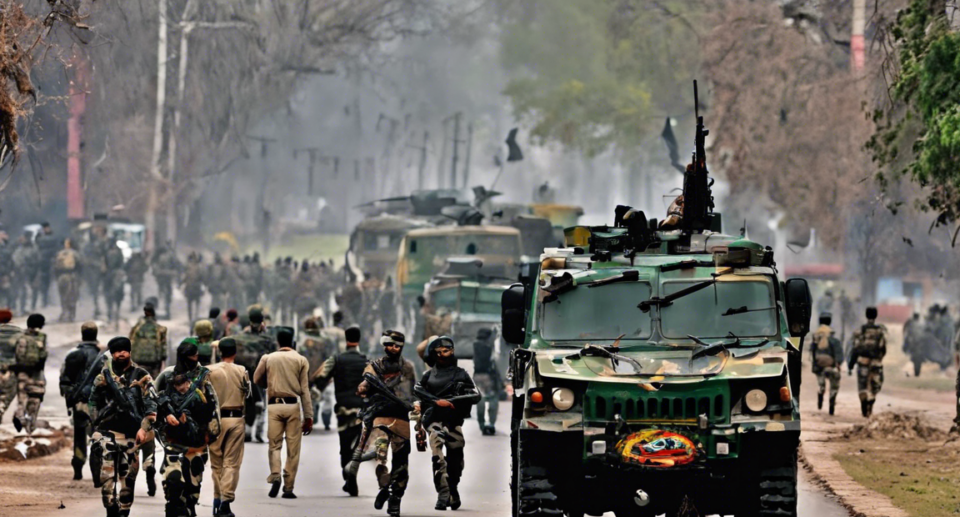Pulwama Attack: Current Situation in 2024

It has been five years since the tragic Pulwama attack in 2019, and its repercussions are still being felt in the region. The attack, which took place on February 14, 2019, in the Pulwama district of Jammu and Kashmir, resulted in the loss of 40 Indian paramilitary personnel. This heinous act was carried out by a suicide bomber belonging to the Pakistan-based militant group Jaish-e-Mohammed.
Current Political Landscape:
Since the Pulwama attack, tensions between India and Pakistan have remained high. The Indian government under Prime Minister Narendra Modi conducted airstrikes in Balakot, Pakistan, targeting alleged terrorist camps in retaliation for the attack. Pakistan, in turn, denied the existence of such camps and retaliated by shooting down an Indian fighter jet and capturing its pilot, Abhinandan Varthaman. The pilot was later released as a gesture of goodwill by Pakistan.
Cross-Border Terrorism Concerns:
The Pulwama attack once again brought to the forefront the issue of cross-border terrorism and the role of Pakistan-based militant groups in stoking violence in the region. India has long accused Pakistan of providing support to such groups, including Jaish-e-Mohammed and Lashkar-e-Taiba, to carry out attacks in Indian territory. The international community, including the United States, has urged Pakistan to take concrete actions against these terrorist organizations operating from its soil.
Impact on Kashmiri Civilians:
The Pulwama attack also had a profound impact on the local population in Kashmir. The incident led to a surge in anti-India sentiments and further alienated the Kashmiri people. The Indian government’s subsequent actions, such as the abrogation of Article 370 in August 2019, which granted special status to Jammu and Kashmir, further fueled tensions in the region.
Security Measures and Counterterrorism Efforts:
In the aftermath of the Pulwama attack, both India and Pakistan have intensified their security measures along the Line of Control (LoC) that divides the two countries in Kashmir. India has been proactive in conducting counterterrorism operations to target militants infiltrating from across the border. The National Investigation Agency (NIA) in India has also been actively investigating the Pulwama attack and has made several arrests in connection with the case.
Diplomatic Efforts and Regional Dynamics:
Despite the ongoing tensions, there have been sporadic efforts to de-escalate the situation and engage in dialogue. The Shanghai Cooperation Organisation (SCO) has provided a platform for both India and Pakistan to interact at the ministerial level. However, the core issues of terrorism and Kashmir remain contentious topics that hinder any meaningful progress in bilateral relations.
Future Prospects and Challenges:
The Pulwama attack serves as a stark reminder of the persistent threat of terrorism in the region and the complex dynamics between India and Pakistan. The lack of trust between the two countries, coupled with deep-rooted historical grievances, continues to pose challenges for peace and stability in South Asia. Moving forward, a concerted effort towards building mutual trust, addressing core issues through dialogue, and cracking down on terrorist infrastructure is essential to prevent similar incidents in the future.
FAQs:
-
What were the main factors that led to the Pulwama attack?
The Pulwama attack was primarily a result of the longstanding conflict between India and Pakistan over the issue of Kashmir. Pakistan-based militant groups took advantage of this volatile situation to carry out attacks against Indian security forces. -
What has been the international community’s response to the Pulwama attack?
The international community, including the United States, has condemned the Pulwama attack and called for concrete action against terrorist groups operating from Pakistan’s soil. -
How has the Pulwama attack impacted the Kashmiri population?
The Pulwama attack further alienated the Kashmiri population and fueled anti-India sentiments in the region. The subsequent security crackdowns and communication blackouts have added to the sense of fear and frustration among the local residents. -
What steps have been taken by the Indian government to address cross-border terrorism?
The Indian government has adopted a proactive approach to counterterrorism, conducting airstrikes and counterinsurgency operations to target militants infiltrating from across the border. The NIA has also been actively investigating the Pulwama attack. -
Is there any hope for peaceful resolution and de-escalation between India and Pakistan post-Pulwama?
Despite the ongoing tensions, there have been sporadic efforts to engage in dialogue and de-escalate the situation. However, the core issues of terrorism and Kashmir remain major roadblocks to any significant progress in bilateral relations.




